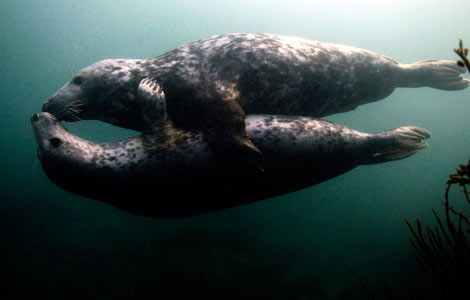Record low temperature recorded in Antarctica
Updated: 2013-12-11 16:59
(Agencies)
|
||||||||
 |
|
Antarctica is pictured in this undated image courtesy of NASA. Scientists found that a high ridge in the East Antarctic Plateau contains pockets of trapped air that dipped as low as minus 136 Fahrenheit (minus 93 degrees Celsius) on Aug 10, 2010, researchers said at the American Geophysical Union meeting in San Francisco on Dec 9, 2013. [Photo/Agencies] |
SAN FRANCISCO - The Arctic air blasting the eastern United States is positively balmy compared to the record minus 136 degrees Fahrenheit (minus 93 degrees Celsius) temperature measured in Antarctica in August 2010, according to research released on Monday.
Scientists made the discovery while analyzing 32 years of global surface temperatures recorded by satellites.
They found that a high ridge in the East Antarctic Plateau contains pockets of trapped air that dipped as low as minus 136 Fahrenheit on August 10, 2010, researchers said at the American Geophysical Union meeting in San Francisco.
The previous record low was minus 128.6 F (minus 89.2 C), set in 1983 at the Russian Vostok Research Station in East Antarctica, said Ted Scambos, lead scientist at the National Snow and Ice Data Center in Boulder, Colorado.
"We had a suspicion this Antarctic ridge was likely to be extremely cold, and colder than Vostok because it's higher up the hill," Scambos said in a statement.
The temperatures are about 50 degrees F colder than anything recorded in Alaska or Siberia.
The research grew out of studies of snow dunes. Scientists noticed cracks in the snow and wondered if the top layer of snow was shrinking. That set them off on a hunt for temperature data.
The super-cold temperatures are due to air being caught and held for a while. If the skies are clear for a few days, the ground radiates remaining heat into space, creating a layer of super-chilled air above the snow.
"By causing the air to be stationary for extended periods, while continuing to radiate more heat away into space, you get the absolute lowest temperatures we're able to find," Scambos said.

 Uruguay becomes 1st nation to legalize marijuana
Uruguay becomes 1st nation to legalize marijuana
 Snowstorm blasts US
Snowstorm blasts US
 2013 Nobel Prize award ceremony in Stockholm
2013 Nobel Prize award ceremony in Stockholm
 Reuters images of the year - politics
Reuters images of the year - politics
 Conjoined babies waiting for surgery
Conjoined babies waiting for surgery
 Chinese say their goodbyes
Chinese say their goodbyes
 Obama shakes hands with Cuban president Castro
Obama shakes hands with Cuban president Castro
 S Africa holds memorial service for Mandela
S Africa holds memorial service for Mandela
Most Viewed
Editor's Picks

|

|

|

|

|

|
Today's Top News
Handshake could signal improving ties
US Congress negotiators reach budget deal
Retirees saddled with kids' costs
Bar lowered for private pilots
Building impact reports will be released
Obama urges Congress to pass budget deal
Beijing announces theme, priorities of APEC
Battle against counterfeit goods enters a new phase
US Weekly

|

|







